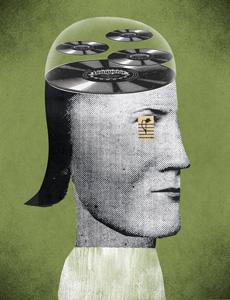Those Tunes in Your Head? Not as Many as You Think
 |
If you’ve ever marveled at being able to recognize a song after hearing just a snatch of it, don’t get too proud of your towering intellect. According to Matthew Schulkind, associate professor of psychology, we don’t actually remember songs from our past as well as we think we do.
“Everybody has this experience that you can flip through the radio, hear a song in a brief snippet, know it and be able to sing along with it as if you heard it yesterday, even though it’s been many years,” Schulkind says. “One of the experiments that I did was an attempt to explore that phenomenon in a laboratory.”
In that study, featured in Discover Magazine’s special Winter 2009 issue and forthcoming in the Annals of the New York Academy of Sciences, Schulkind gathered a group of older adults and played songs for them that were popular at various times throughout the 20th century.
“What I expected was that older adults would hear these songs and, more often than not, tears would come to their eyes and they’d be able to tell me everything about them—the author, the performer, the title, the lyrics,” Schulkind says. “But that’s not what happened at all. People recognized the songs, and they knew more about songs from the ’40s and ’50s than they did about songs from the ’80s and ’90s. But they weren’t able to identify the titles or performers very well.”
This suggests that our ability to remember music, like our ability to remember other things, erodes with time, Schulkind says. That might not seem to be a surprising discovery, but in the context of the conventional wisdom about music and memory, it is. “This idea that there are a large number of songs from your youth you can hear that you remember as well as if you heard them yesterday is a myth,” he says. “There are probably a small number of songs for which that’s true for any given person.”
Schulkind is a pioneering member of a small but growing cohort of psychologists who study musical memory. Once considered to be the Rodney Dangerfield of memory, the study of musical memory is gaining respect as it reveals more clues to how the brain organizes and processes chunks of information over time. The larger question at stake is how musical memory relates to memory for words and pictures.
It’s becoming apparent, Schulkind says, that musical memory falls into the category of what researchers call procedural memory, which governs tasks and activities that are learned over time.
“In that way, it’s just like once you start to hit a tennis ball or shoot a basketball,” he says. “You don’t really have to think about what happens next.” That might explain why certain songs get stuck in our heads when we don’t want them to. “Once it starts, music just sort of has a mind of its own,” he says.
Schulkind is now devising new projects and experiments in an effort to uncover more about the defining characteristics of musical memory. “My interest is in trying to understand whether the principles, theories and ideas we have that govern memory for nonmusical stimuli also apply to musical stimuli,” he says. “The larger question is whether the brain architecture that’s used to learn and remember melodies is the same as the brain architecture used to remember other kinds of stimuli."
Image copyright 2009 David Plunkert, c/o TheSpot.com.